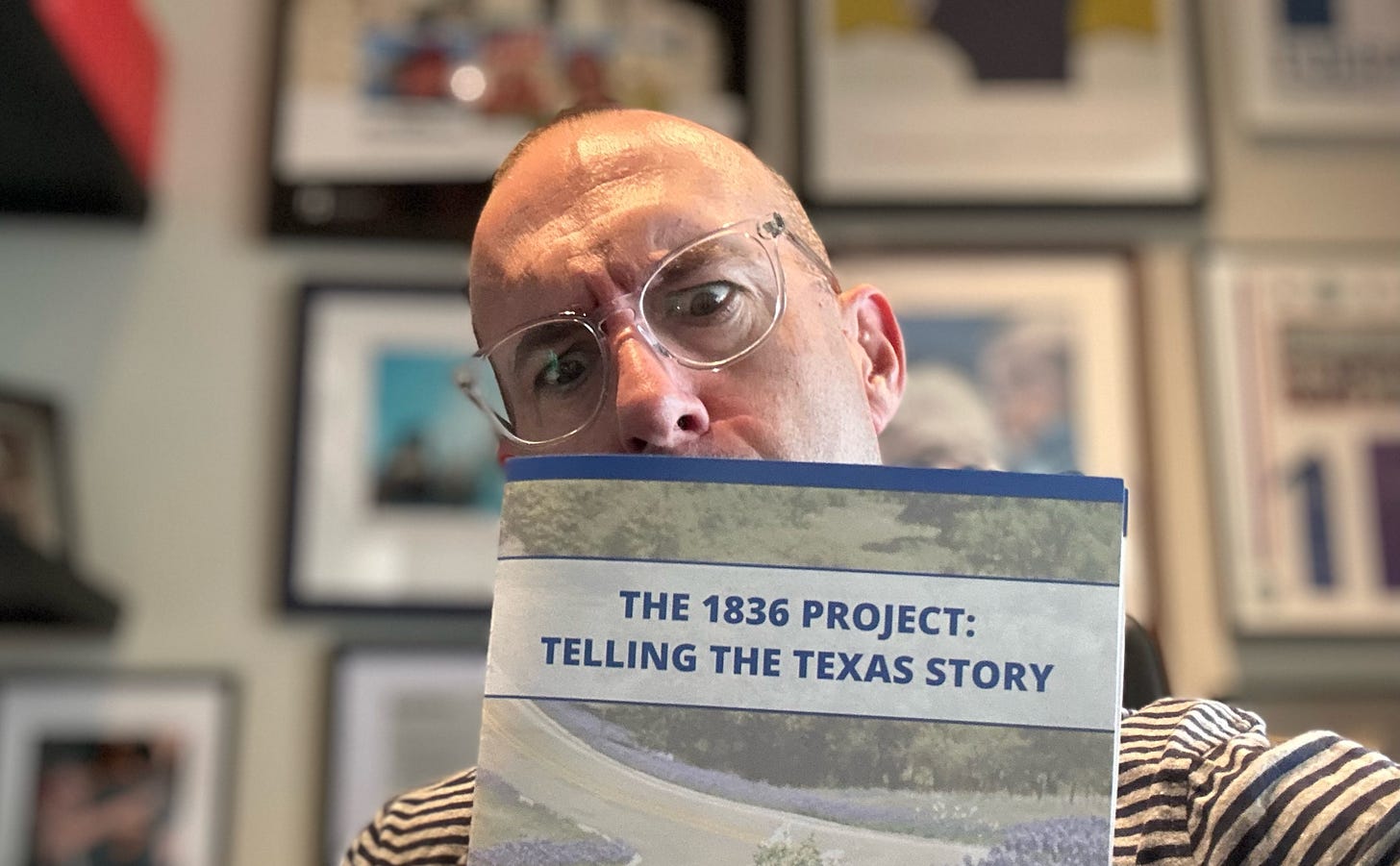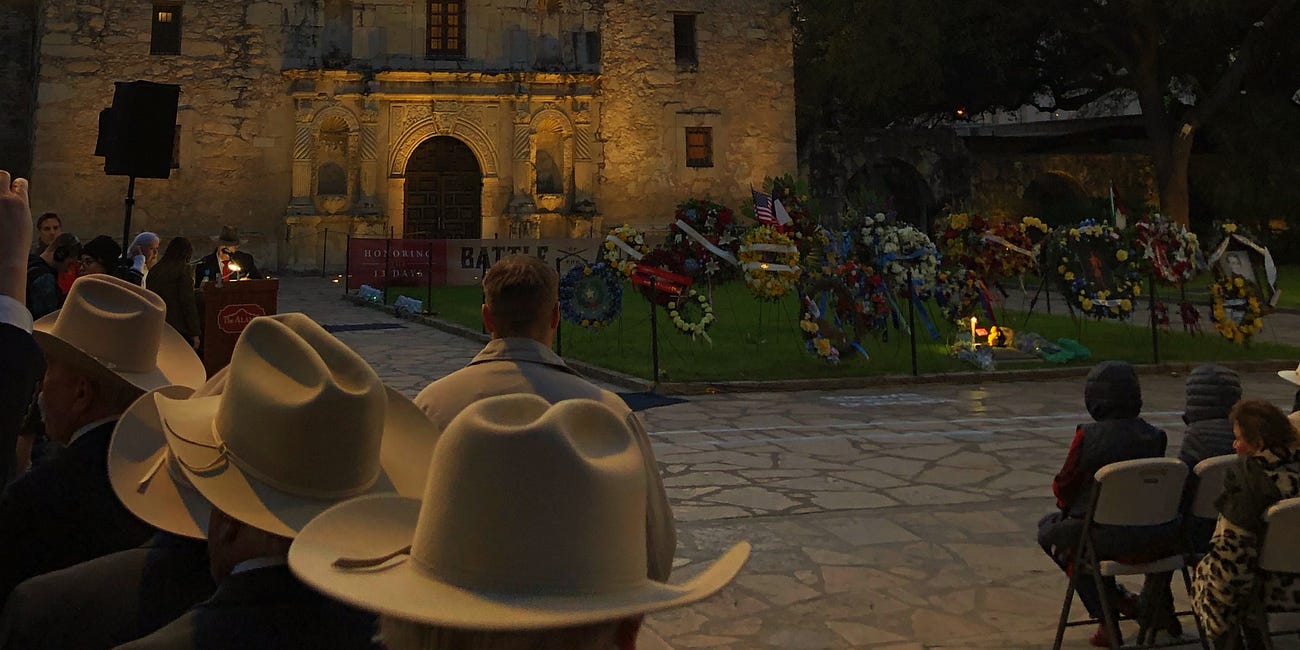This is the always free, reader-supported weekend edition of The Experiment, your official hopepunk newsletter. If you’d like to support my work, become a paid subscriber or check out the options below. But even if you don’t, this bugga free. Thanks for reading!
There is a new front to the culture wars in Texas—the DMV. The other day my wife went to get her driver’s license renewed and came home with a copy of The 1836 Project: Telling the Texas Story, an 11-page pamphlet (with pictures!) that attempts to set the history of this great state back to rights.
You, being so good-looking, discerning, and intelligent, might have several questions. Hey, Jason, you might begin, don’t Texans already have to take Texas state history in the fourth and seventh grades? You, being you, would not stop there. And why would they be giving out history pamphlets at the DMV? And here you bring it home: Wait a minute, does this have anything to do with “The 1619 Project” that retold American history through the lens of slavery?
Those are great questions, and they go to show why people say my readers are some of the smartest, loveliest, and best-looking people you’ll ever meet. And yes, Texas spends more time teaching state history than one might think reasonable, but in 2019 The New York Times published “The 1619 Project,” and in 2020 there were a bunch of civil rights marches that made it seem like racism and slavery were pretty awful, full stop.
And then in 2021, the whole reorienting of history around that notion of slavery’s inherent badness and racism’s stubborn endurance came to Texas in the form of 2021’s Forget the Alamo, which I co-wrote with Bryan Burrough and Chris Tomlinson. It all kinda got lumped together in the minds of Texas Republicans, according to one national report.
The iconic Alamo has become a target of progressives seeking to reframe the siege, not as a last stand for freedom but as a struggle over slavery, with the doomed defenders on the losing side of both the conflict and history.
Promoting that interpretation is a widely reviewed book released June 8, “Forget the Alamo: The Rise and Fall of the American Myth,” which was #1 on the Amazon bestseller lists Thursday for Mexican History as well as the History of the Southwestern U.S.
Like the earlier New York Times’ “1619 Project,” which attempts to reframe the American Revolution as a war in defense of the institution of slavery, “Forget the Alamo” argues that the fallen heroes of the Alamo were not heroes at all.
Texas Republicans handled this about as maturely as you’d expect. Lt. Gov. Dan Patrick gets all the credit for banning a book talk at the state history museum, but the backlash was more broadly based than that. The Texas Republican Party chairman1 commemorated Flag Day by calling us “nefarious cancel culture cretins.” And Dawn Buckingham, then a state senator, now the Texas Land Commissioner, and forever just a sweetheart, called us the “elitist media” and tweeted, “I'll ALWAYS protect the Alamo & our Texan heritage by NOT allowing anyone to tell us otherwise.”
The powers-that-be decided that there ought to be a law, so they wrote a really dumb one.
Addressing “concerns that civics education in this state does not sufficiently address the stories and unique history of Texas,” lawmakers created The 1836 Project to promote a patriotic teaching of state history by paying historians to put a politically acceptable version of history into a badly designed pamphlet to be distributed at the office where you get your driver’s license. Yes, I know how dumb that sounds. Welcome to Texas.
To be fair, “The 1836 Project” is better than the textbooks they give to seventh graders. For one, the pamphlet is much shorter. For another, “The 1836 Project” mentions slavery as being a factor in Texas’ secession from Mexico, something textbook publishers, who are mindful of needing the approval of Republican elected officials, shy away from.
But it’s how slavery fits into “The 1836 Project” story that numbs the sting. The pamphlet is an idiot’s guide to slavery in Texas history that makes it seem like slavery just kinda happened to Texas, a byproduct of circumstance and geography.
Mexico outlawed slavery in 1829 but exempted Texas, which is when, according to the pamphlet, “the presence of enslaved people among these Americans proved a dilemma for Mexico.” Mexicans saw slavery as immoral; the American immigrants “saw it as necessary to develop the region’s agricultural product.” Let’s give “The 1836 Project” its due for describing “these differences of opinion” as a “constant source of friction.”
But that’s where this core source of conflict between the immigrants and the Mexicans gets ushered off center stage in favor of the myth of liberty. You see, #NotAllTexians owned slaves. Only “a few held enslaved people as property,” notes the pamphleteers, “but the overwhelming majority did not.” Seeming to excuse the Anglo immigrants of the sin of slavery, this ignores the widespread practice of renting out one’s enslaved workers to those not wealthy enough to own them yet.
Even more broadly, these Americans moved into Texas in the first place to create a cotton economy, and at that time the business model for cotton required an enslaved workforce. “Texas must be a slave country. Circumstances and unavoidable necessity compel it,” said Stephen F. Austin. So central was slavery’s legality to their vision for Texas that Austin lobbied the Mexican government to continue to allow legal slavery in Texas. Besides, he said, they couldn’t be expected to just free them. Emancipated slaves, said Austin, would be nothing more than “vagabonds, a nuisance and a menace.”
“Texas must be a slave country. Circumstances and unavoidable necessity compel it.” Stephen F. Austin
This was the issue fueling the fight between the Federalists, who wanted to be able to make up their own state laws on slavery and the Centralists, who wanted to abolish it. But that underlying reason is elided by “The 1836 Project,” which casts Texas independence as a “revolt… against their loss of local control.” They were fighting about the admittedly important abstractions of liberty and freedom and not their ability to enslave a workforce necessary for their economic survival.
One point I wish we would have made clearer in Forget the Alamo is how Americans have more or less moved on from the abusively stupid notion that the Civil War was about states rights, but Texas is holding onto a similar, yet equally stupid perspective that the war for Texas independence was about local control.
“The 1836 Project” is actually a huge missed opportunity, and this goes equally for those who insist that all American history is the fruit of the poisonous tree of slavery. One thing I took away from the experience of researching Forget the Alamo was learning about all the ways that those who accepted the facts of our common history were able to improve our present-day circumstances. Our history is a story of a constant struggle for improvement, inclusion, acceptance, and celebration, but we only get to the better stuff when we own up to the ugly truths.
But when we don’t have the moral courage to admit the truth about Texas history that we do about American history, we end up with dumb pamphlets at the DMV.
Yee. See also: haw.
Jason Stanford is a co-author of NYT-best selling Forget the Alamo: The Rise and Fall of an American Myth. His bylines have appeared in the Washington Post, Time, and Texas Monthly, among others. Follow him on Threads at @jasonstanford, or email him at jason31170@gmail.com.
Further Reading
Critical Alamo Theory
Despicable Me
We set up a merch table in the back where you can get T-shirts, coffee mugs, and even tote bags now. Show the world that you’re part of The Experiment.
We’ve also got a tip jar, and I promise to waste every cent you give me on having fun, because writing this newsletter for you is how I have fun.
Buy the book Texas Lt. Gov. Dan Patrick banned from the Bullock Texas History Museum: Forget the Alamo: The Rise and Fall of the American Myth by Bryan Burrough, Chris Tomlinson, and myself is out from Penguin Random House. The New York Times bestseller is out in paperback now!
This is alleged war criminal Allen West who was recently elected Dallas County Republican Party Chairman.












Wow, Jason, you’ve done it again. I always wondered why you were listed as an author of Forget the Alamo. Burrough had published six important books. Tomlinson had published one important book. But you? Other than your book written by primarily by James Moore, you’d only been successful at being a political flak, like our bud Bob Mann, not an accomplished author. B&T listed you as an author of the book to ensure that you’d keep using your considerable flak skills to defend it going forward ad infinitum. The book dwells on Travis’s, Bowie’s, and Crockett’s personality flaws, but not those of Houston or others. Not do y’all compare the Texan creation myth with other creation myths. Your failure to do so makes it seem that Texans were more evil than any other social group. I don’t accept y’all’s preachy premise that the Texians were any more evil than the Mexicans, who ordered the murder of all the Texian soldiers wo surrendered at the Alamo and Golad. I’d like to believe that what you did with “Forget the Alamo” was just another flak job motivated solely by your own financial gain. Hell, I’ve got a kid to put through college like you, so I understand how much financial pressure you’re under to say and do things that generate free advertising and the resulting increase in sales of your book. I’m not under those pressures and biases. You may feel that I I’m as biased as you are. Maybe so. The only way to find out is for us to meet and talk together. What say you about us meeting?